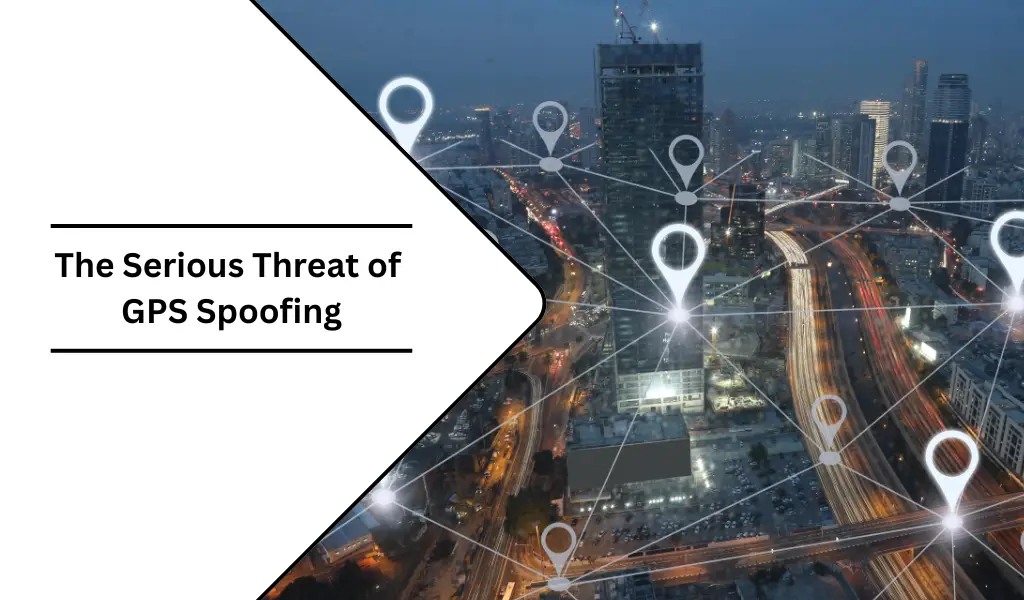
GPS Spoofing, the serious threat it has on us and how we can stop it.
In today’s highly interconnected world, Global Positioning System (GPS) technology plays a pivotal role in both our daily lives and critical infrastructure. From navigating our morning commutes to coordinating military operations, GPS is a silent workhorse we often take for granted. However, this reliance brings with it a significant vulnerability: the threat of GPS spoofing.
What is GPS Spoofing?
GPS spoofing is a malicious act where false GPS signals are broadcast to deceive GPS receivers. Essentially, a spoofer sends fake signals to trick devices into thinking they are in a different location. This can result in anything from minor inconveniences to severe security breaches.
Why is GPS Spoofing a Serious Threat?
- Transportation and Navigation:
- Aviation: GPS spoofing can mislead aircraft, potentially leading to disastrous consequences. Pilots rely on GPS for accurate navigation, and spoofed signals can divert planes off course or even cause collisions.
- Maritime: Ships use GPS for route planning and collision avoidance. Spoofing can lead to vessels being deliberately misdirected, causing delays or accidents.
- Automobiles: Autonomous vehicles and modern cars use GPS for navigation. Spoofing can disrupt their paths, leading to traffic chaos and accidents.
- Military and National Security:
- Military operations depend heavily on GPS for positioning, navigation, and timing (PNT). Spoofing can mislead troops, disrupt supply chains, and compromise missions.
- GPS is also critical for missile guidance systems. Spoofing these systems could lead to catastrophic failures and unintended targets.
- Financial Systems:
- Many financial transactions are timestamped using GPS signals. Spoofing can disrupt these timestamps, potentially leading to erroneous transactions and financial instability.
- Emergency Services:
- First responders rely on GPS to reach emergencies quickly. Spoofing can delay their response, endangering lives and property.
- Agriculture:
- Modern farming techniques use GPS for precision agriculture. Spoofed signals can mislead equipment, leading to inefficient resource use and crop damage.
How is GPS Spoofing Executed?
GPS spoofing can be executed with relatively low-cost equipment and technical know-how. A spoofer generates false GPS signals with higher power than the authentic ones, thereby overpowering the legitimate signals. This makes it a relatively accessible form of cyberattack.
Mitigation Measures
- Anti-Spoofing Technologies:
- Modern GPS receivers are being equipped with anti-spoofing technologies that can detect and reject false signals.
- Encryption:
- Encrypting GPS signals can make it more difficult for attackers to generate authentic-looking spoofed signals.
- Multi-Source Navigation:
- Relying on multiple navigation systems (e.g., combining GPS with GLONASS, Galileo, or inertial navigation systems) can provide redundancy and cross-verification, improving resilience against spoofing.
- Awareness and Training:
- Educating users and operators about the risks and signs of GPS spoofing can help in early detection and response.
GPS spoofing is a serious threat that can disrupt numerous sectors, from transportation and military operations to financial systems and emergency services. As our reliance on GPS continues to grow, so does the importance of safeguarding this critical technology. Through a combination of advanced technologies, encryption, multi-source navigation, and awareness, we can mitigate the risks and ensure the continued reliability of GPS systems.
Other Articles on GPS Spoofing: What is GPS spoofing? | McAfee

Microsoft-Signed Drivers Used in Ransomware Attacks: When Trust Becomes a Threat
Facebook Twitter LinkedIn Cybercriminals have crossed a new threshold: they’re now exploiting Microsoft-signed drivers — software components that should be among the most trusted on

Ransomware in the Age of AI: The New Battleground and How JND Consulting Group Keeps You Safe
Facebook Twitter LinkedIn In recent years, ransomware has evolved from a relatively crude cyber threat to a sophisticated, AI-fueled weapon capable of disrupting businesses, governments,

Overview of Department of Financial Services Cybersecurity Regulation
Facebook Twitter LinkedIn Navigating the New Cybersecurity Landscape In 2023, the Department of Financial Services (DFS) introduced amendments to its Cybersecurity Regulation, with the implementation
